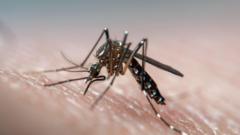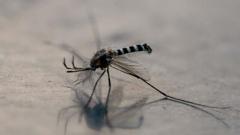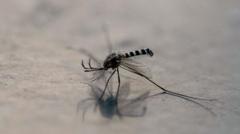Scientists from the University of California have engineered male mosquitoes to lose their hearing, effectively hindering their ability to mate with females. This innovative approach aims to control populations of disease-carrying mosquitoes responsible for outbreaks like dengue and Zika.
New Genetic Approach Targets Mosquito Mating to Combat Disease Spread

New Genetic Approach Targets Mosquito Mating to Combat Disease Spread
Researchers have developed a novel genetic method to disrupt mosquito mating, offering a potential strategy to significantly reduce disease transmission.
In an intriguing twist to mosquito control measures, researchers have discovered that disabling the hearing of male mosquitoes could prove to be an effective strategy to combat the transmission of vector-borne diseases such as dengue, yellow fever, and Zika. By rendering male mosquitoes deaf, they struggle to locate and mate with females, ultimately contributing to a decline in future generations.
The team from the University of California, Irvine focused their research on the Aedes aegypti species, which is responsible for transmitting viruses to approximately 400 million people worldwide annually. While airborne, male mosquitoes utilize auditory signals created by female wingbeats to engage in mating pursuits. By altering a specific genetic pathway governing sound perception, scientists successfully rendered males incapable of connecting with females even after prolonged exposure together in captivity.
During the study, researchers targeted a vital protein associated with hearing, known as trpVa, resulting in deafened males that demonstrated no responsiveness to the alluring sounds of potential mates. Observations indicated that while wild males readily mated and fertilized nearly all available females, those rendered deaf experienced a complete lack of mating activity, highlighting the effectiveness of the genetic modification.
Dr. Joerg Albert, a noted mosquito mating expert from the University of Oldenburg in Germany, commended the research, noting that disrupting the auditory senses offers a promising avenue for controlling mosquito populations. He emphasized the essential role of sound in mosquito reproduction and the potential risks of completely removing males from the reproductive equation. He also acknowledged that the introduction of sterile males in targeted areas remains a viable strategy for managing mosquito populations.
Though mosquitoes are well-known for spreading diseases, they also play a crucial role in various ecosystems, serving as food sources for numerous creatures and acting as pollinators. This understanding prompts a careful balance as researchers develop new methods to mitigate the public health risks posed by these insects while maintaining their ecological importance.
The team from the University of California, Irvine focused their research on the Aedes aegypti species, which is responsible for transmitting viruses to approximately 400 million people worldwide annually. While airborne, male mosquitoes utilize auditory signals created by female wingbeats to engage in mating pursuits. By altering a specific genetic pathway governing sound perception, scientists successfully rendered males incapable of connecting with females even after prolonged exposure together in captivity.
During the study, researchers targeted a vital protein associated with hearing, known as trpVa, resulting in deafened males that demonstrated no responsiveness to the alluring sounds of potential mates. Observations indicated that while wild males readily mated and fertilized nearly all available females, those rendered deaf experienced a complete lack of mating activity, highlighting the effectiveness of the genetic modification.
Dr. Joerg Albert, a noted mosquito mating expert from the University of Oldenburg in Germany, commended the research, noting that disrupting the auditory senses offers a promising avenue for controlling mosquito populations. He emphasized the essential role of sound in mosquito reproduction and the potential risks of completely removing males from the reproductive equation. He also acknowledged that the introduction of sterile males in targeted areas remains a viable strategy for managing mosquito populations.
Though mosquitoes are well-known for spreading diseases, they also play a crucial role in various ecosystems, serving as food sources for numerous creatures and acting as pollinators. This understanding prompts a careful balance as researchers develop new methods to mitigate the public health risks posed by these insects while maintaining their ecological importance.









